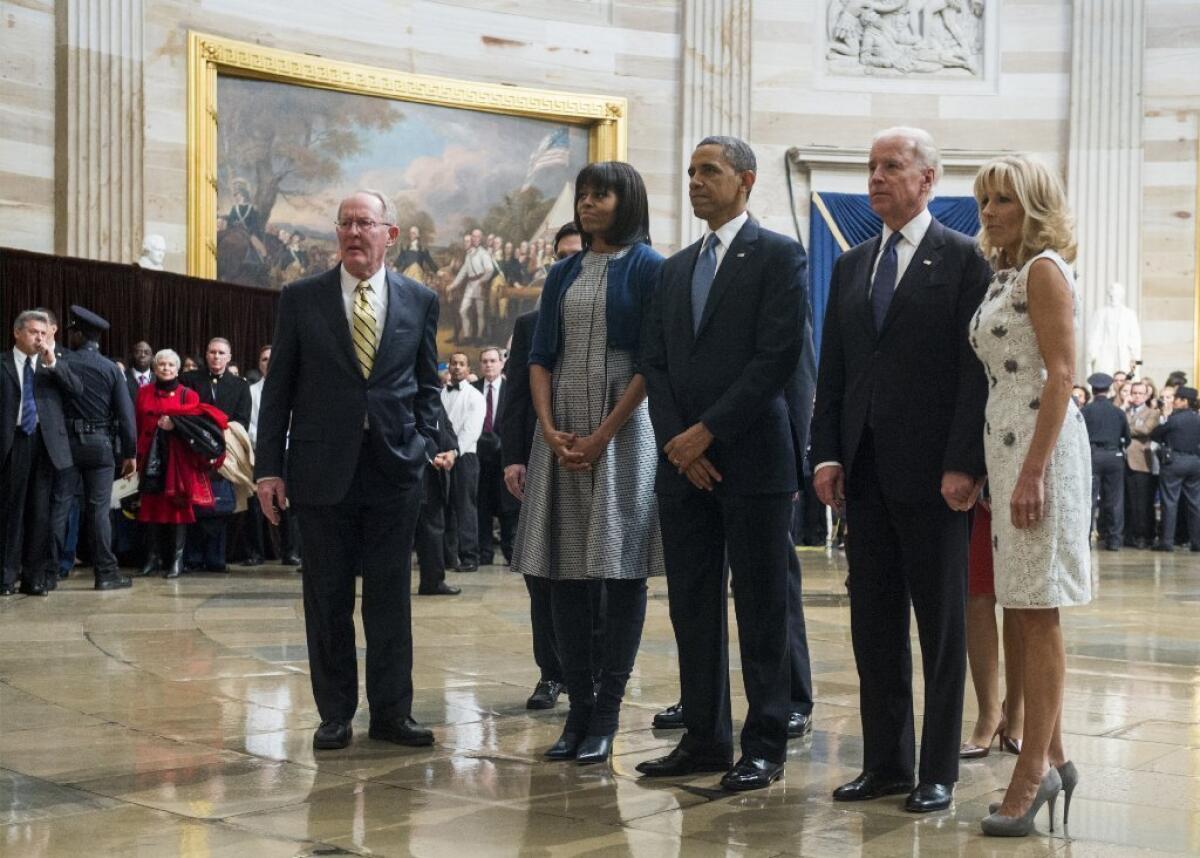Can conservatives celebrate Dr. King’s holiday?

- Share via
The observance of the Martin Luther King Jr. holiday, overshadowed somewhat by President Obama’s inauguration, inspired more than a few writers to complain about the “sanitization” of King’s message. The complaint has some validity: King wasn’t just an opponent of segregated public accommodations and Jim Crow laws; he also preached arguably radical ideas about economic equality, and he opposed the war in Vietnam. He was in Memphis, the site of his assassination, to show solidarity with striking sanitation workers.
In a sermon Monday at Boston’s 43rd annual Martin Luther King Jr. Memorial Breakfast, the Rev. Jonathan Walton, minister at Harvard University’s Memorial Church, said that 1965 was the year in which King pivoted from the civil rights campaign for which he is remembered “to human rights, to economic justice” and to promoting peace in Vietnam. “It’s easier to celebrate a dead icon,” Walton said, “than heed the admonitions of a prophet.”
At the Huffington Post, Dion Rabouin pointed to this quotation from a 1967 King speech: “There are 40 million poor people here, and one day we must ask the question, ‘Why are there 40 million poor people in America?’ And when you begin to ask that question, you are raising a question about the economic system, about a broader distribution of wealth. When you ask that question, you begin to question the capitalistic economy.”
PHOTOS: The Rev. Martin Luther King Jr. -- and the civil rights struggle
These observations are an important historical corrective to the popular image of a King whose only dream was that “my four little children will one day live in a nation where they will not be judged by the color of their skin but by the content of their character” -- a sentiment that perversely is cited by “colorblind” opponents of affirmative action.
But suppose that King wasn’t just an opponent of Jim Crow but also a radical critic of capitalism. Does it follow that Americans who don’t agree with King’s larger message are hypocrites when they pay tribute to him every year? That’s the drift of a lot of the revisionism about King’s message.
But you can make a case that the King holiday from the start was grounded in what Walton might call King’s pre-1965 vision.
When he signed legislation establishing the holiday in 1983, President Reagan -- not surprisingly -- didn’t hail King for his critique of capitalism. Instead, Reagan described the martyred civil rights leader’s legacy this way:
“In 1968, Martin Luther King was gunned down by a brutal assassin, his life cut short at the age of 39. But those 39 short years had changed America forever. The Civil Rights Act of 1964 had guaranteed all Americans equal use of public accommodations, equal access to programs financed by federal funds, and the right to compete for employment on the sole basis of individual merit. The Voting Rights Act of 1965 had made certain that from then on black Americans would get to vote. But most important, there was not just a change of law; there was a change of heart. The conscience of America had been touched. Across the land, people had begun to treat each other not as blacks and whites but as fellow Americans.”
Is this an incomplete account of King’s agenda? Undoubtedly. But it also chronicles a legal revolution that eventually came to be endorsed by a lot of Americans who would balk at King’s analysis of the class structure of American society, let alone some of his prescriptions for eradicating inequality, such as a “guaranteed income.”
Would this be a better country if those Americans -- those conservatives, let’s say -- also rejected the Civil Rights Act, the Voting Rights Act and King’s vision of white and black children playing together? Of course not. Nor should they be accused of hypocrisy for celebrating King’s memory.
ALSO:
‘Plug-in volunteering’ doesn’t cut it
More to Read
A cure for the common opinion
Get thought-provoking perspectives with our weekly newsletter.
You may occasionally receive promotional content from the Los Angeles Times.










